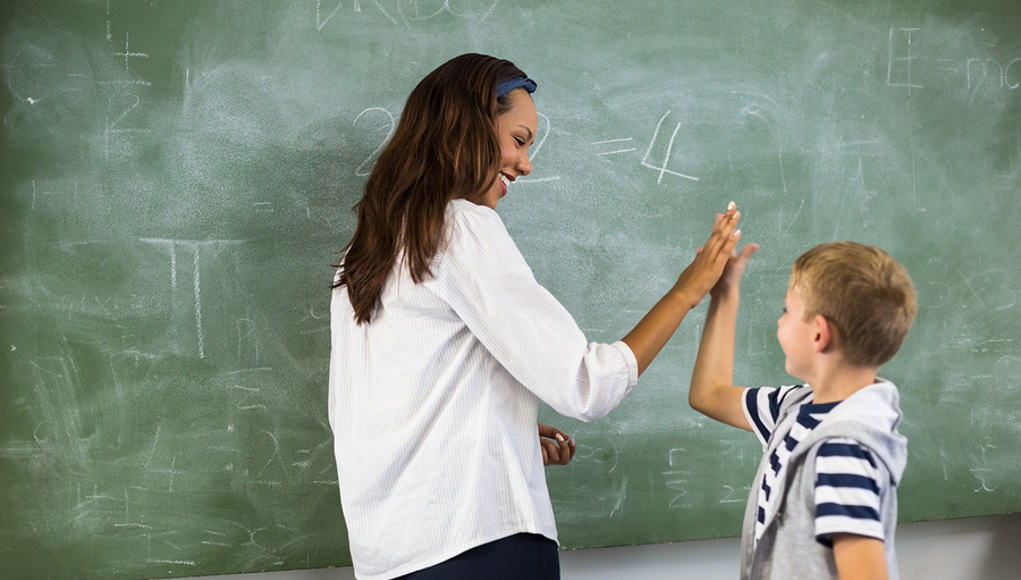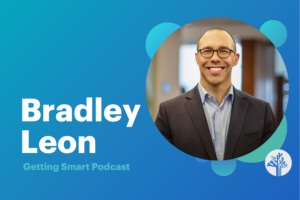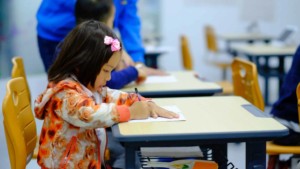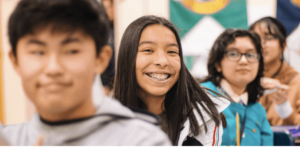How Students Can Succeed with Personalized Learning

By Jodie Woodruff
To some teachers, personalized learning sounds like a way around the basics that so many students want to avoid. I get it, I really do. Labels aside, let me tell you what it is I think we’re aiming at: authentic learning experiences that are based on student interests and designed to challenge and engage students in real environments.
Over the years, I’ve come to realize that there is not one “right” way to motivate students to take control of their own education. As someone who teaches entrepreneurship, the crucial step is giving student-partners the strides and strifes of learning. I say student-partners because as their teacher or advisor, I work with them in what I consider a learning partnership for both sides.
For 21 years, a network of six public high schools in Rhode Island has provided an advisory-based program wherein all students have opportunities to build relationships and learn from mentors in the field of study that interests them. Students spend time in internships where they work closely with a mentor on real problems and experiences, learning in real world settings. Parents and families also play a role in the learning process, helping to shape students’ learning plans and acting as resources to the school community.

This design results in student-centered learning, where students actively invest in their learning and a supportive community of educators, professionals and family members challenges students to pursue their interests.
A crucial step to genuine personalized learning is to avoid approaches that are pop culture labels or buzz words. For instance, I am not the leader of the Dead Poets Society. It’s never enough to ask a student to break out, be bold and seize the day. That carpe diem language is similar to a coach’s locker room pep talk. Successfully seizing the day requires that students know what they are grabbing and why, and once they’ve seized it, what to do with it.
Individualized learning also isn’t cracking the code where, with minimal directions, one individual working alone has to find all the answers. Personalized learning should grow out of the three R’s coined by the Bill & Melinda Gates Foundation: rigor, relevance and relationships.

When students are at the center, they are learning about what truly engages and challenges them, and that makes learning authentic and relevant. They create their project proposals based on their interests, skills, knowledge and resources, and match these plans to learning objectives and goals. They create an essential guiding question for their project. They conduct primary and secondary research. And they create a timeline and explain how they think they will apply and benefit from their efforts.
Also, when students develop their projects they consider social capital, a topic we don’t often talk about in schools. Students may ask questions such as: Who do I know that can help me? What resources do I need from others and how will I obtain them? They learn through this process how to ask for help, and they do it because they’re invested and interested. And when they ask, I ask questions too, reinforcing the value of this real-world skill: Did you do X? Did you do Y?
Believe me, the process is powerful—but that doesn’t mean it’s seamless. Like all of us, students get discouraged and want to give up. This is where initial dialogue, strong relationships and learning teams with mentors, parents and advisors can help students stay committed. Personalized learning isn’t completely independent—there’s guidance and coaching along the way.
Throughout the time I have shared with student-partners, I have had to continually reevaluate each student’s capacity. How much has he grown? How much more can she take on? And when the process truly works, I become the student, and it is wonderful. So, I have come to the conclusion that individualized learning is, in fact, vital for real student growth and I urge all teachers to embrace it.
For more, see:
- What is curriculum? From Managed Instruction to Personalized Learning
- Personalizing Math for Bear Creek Middle School Students
- How the President-Elect can Scale Personalized Learning
Jodie Woodruff is the director of the Met Center for Innovation and Entrepreneurship at The Metropolitan Regional Career and Technical Center in Providence, Rhode Island, and was recently recognized as an Allen Distinguished Educator for her pioneering work in entrepreneurship education. Follow the Met Center on Twitter: @MetSchool.
Stay in-the-know with all things EdTech and innovations in learning by signing up to receive the weekly Smart Update.






0 Comments
Leave a Comment
Your email address will not be published. All fields are required.